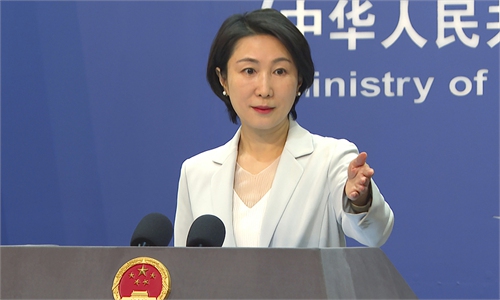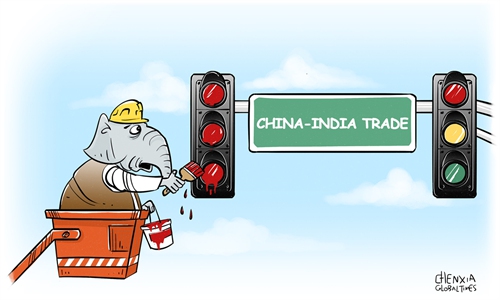
Xiaomi India Photo: VCG
ByteDance, the owner of TikTok, will close its music-streaming app Resso in India by month-end, following the Indian government's request in December to Apple and Google to remove Resso from their app stores, the Global Times learned from the company and media reports.
The move reflects a broader crackdown on foreign companies, especially those from China, by Indian authorities. Experts said that India's reputation as a "world factory" under Modi's ''Make in India'' initiative contrasts with its challenging business environment and lack of transparency in market regulations, making it a less favorable site for foreign companies.
"Unfortunately, owing to local market conditions, we can no longer continue to serve users of Resso in India…We have therefore taken the decision to shut down Resso and its associated operations on January 31. Users will be offered a refund of their remaining subscription fees, " a ByteDance spokesperson said.
The move comes amid India's intensified crackdown targeting Chinese-related businesses, including those in the digital industry, for so-called national security reasons, Qian Feng, director of the research department at the National Strategy Institute at Tsinghua University, told the Global Times on Wednesday.
The move has badly damaged the legal interests of Chinese companies in India and violated the principles of non-discrimination and fair competition in the market economy, as defined by the WTO, Qian said.
India was the last market where Resso operated after the company ended the music-subscription service in Brazil and Indonesia to launch another streaming endeavor in those countries, called TikTok Music, according to American media outlet Business Insider.
TikTok has been banned in India since 2020, when the government pushed out dozens of China-affiliated apps amid a geopolitical scuffle with China, the report said.
ByteDance has expanded its music ventures with the introduction of TikTok Music in Australia, Singapore, Mexico, Indonesia and Brazil.
Resso proved to be successful and gained popularity among Indian users. According to app analytics firm data.ai, Resso had more than 21 million downloads on iOS and Android devices in India last year, with users contributing $2.9 million in in-app purchases.
Experts said that given India's intensified moves targeting foreign businesses, the decision to pull out Resso is not a surprise.
India's move targeting Resso only serves to "twist the knife in the wound" when it comes to worsening the business environment of India as well as China-India economic and trade relations, Qian said, noting that it provides new evidence of India being a "graveyard for foreign companies" with its unyielding crackdowns.
In December, the Directorate of Enforcement of India arrested three senior employees of Vivo's India unit, including the interim CEO and CFO and a consultant, under the provisions of the Prevention of Money Laundering Act, Indian news agency PTI reported, in India's intensified clampdown on Chinese companies.
Chinese companies are not alone in India's targeted moves. In recent years, the South Asian country has increased pressure on foreign companies through what some perceive as unfounded charges.
Notably, Google, Amazon, Nokia and Samsung faced substantial fines in the country.
Additionally, companies like Xiaomi, OPPO, Vivo and Intel have encountered obstacles in the Indian market, according to media reports.
Data from the Indian government showed that, from 2014 to 2021, nearly 2,800 foreign companies registered in India had closed their operations, accounting for about one-sixth of the total number of multinationals in the country, the Xinhua News Agency reported.
Before 2020, there were more than 1,000 Chinese enterprises in India, and there were tens of thousands of staffers from China. Now, there are no more than 300 Chinese companies in the country and fewer than 800 personnel, due to India's worsening business environment and clampdown on foreign businesses, a senior India-based industry insider told the Global Times on Wednesday on condition of anonymity.
Due to restrictions, regular financial inspections, fines and visa denials from the Indian side, the overall business of Chinese enterprises in the country has declined, while the scale of investment is shrinking, the insider said.
Experts said that Chinese companies should take this as a lesson and put more emphasis on political factors in risk assessments of the Indian market.
"Asset allocation should be carried out reasonably based on these risks, and asset-heavy operations must be avoided to the greatest extent," Qian said.



